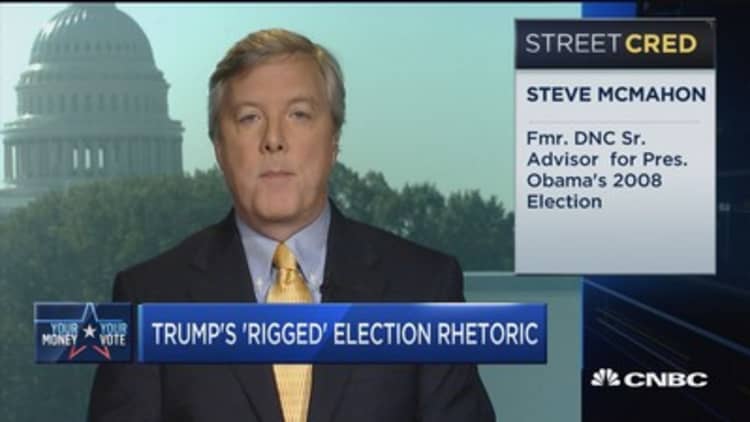
Donald Trump is going to lose the presidential race in three weeks, probably quite badly. And as he goes down, Trump is attempting to take American democracy with him.
The GOP presidential candidate on Monday tweeted:
Republican leaders deny this because it isn't true.
The American election system — run at the state level often by Republican governors — is remarkably free of voter fraud. Over 105 million people voted in the 2000 presidential election. A Justice Department crackdown under President George W. Bush turned up 120 people who allegedly committed fraud or .0001 percent of the electorate.
Justin Levitt, a professor at Loyola Law School in Los Angeles, tracked every significant report of voter fraud at the polls between 2000 and 2014. He found 31 instances out of over 1 billion votes cast. Voter fraud in the United States is vanishingly rare. It happens — and defenders of the theory will always trot out isolated instances — but on such a microscopic level as to be entirely meaningless.
Voter suppression through restrictive voter identification laws, and curtailed early voting, is a much larger problem.
Trump in his repeated warnings of a "rigged" election also fails to note that many critical swing states including Ohio, Florida, Iowa, Nevada, New Mexico, North Carolina and Wisconsin are run by Republican governors who oversee the voting. Trump, by claiming the election will be rigged, could also be calling into question the legitimacy of Republican House and Senate candidates who win in close races.
And in raising the specter of the election being stolen from him, Trump is once again rebuking his own running mate, Indiana Gov. Mike Pence, who said on Sunday that Republicans would "absolutely accept the results of the election."
House Speaker Paul Ryan also implicitly rebuked Trump late last week. "Our democracy relies on confidence in election results, and the speaker is fully confident the states will carry out this election with integrity," Ryan spokesperson AshLee Strong said in a statement late last week.
Trump's "rigging" claims go well beyond election fraud. He also claims the media is attempting to rig the election by reporting on his audiotaped bragging about committing sexual assault and on women's claims of unwanted sexual advances by the GOP nominee. Trump has dismissed his accusers as liars he's never met and in some cases said they would be too ugly for him to assault.
The message has filtered down to Trump's loyal supporters who now speak of armed insurrection and assassination of Hillary Clinton should she win the election. Trump has urged his backers to show up at the polls to "monitor" voting in heavily Democratic areas, perceived by some as a coded message encouraging intimidation of nonwhite voters.
And the Trump line of attack on voting and the media is consistent with his efforts to undermine other critical institutions of American democracy. He regularly insists the government's economic statistics, produced by nonpolitical professional staff, are faked. He insists the debates are rigged against him. It's part of a long tradition for the GOP nominee who for years whined that the Emmy awards were rigged to deny a prize to his reality TV show "The Apprentice." Trump's ego is such that the only way he can explain losing is to argue that he never really lost.
All of this calls into question what will actually happen should Trump lose the election. And this is where the margin both in total votes and the Electoral College will matter, even though it shouldn't.
Clinton now leads in the Real Clear Politics polling average by 5.5 percentage points and in the Huffington Post average by 7.5 points. These leads would produce a comfortable total vote win. If Clinton wins Ohio and Florida and other swing states now trending in her direction, she would rack up 340 electoral votes. That number could go even higher if formerly safe GOP states including Arizona, Utah and Alaska somehow tip into her column, which now seems possible.
Such an Electoral College landslide would quickly wipe away any claims from Trump that the election was stolen. Clinton aides take this into account when deciding where to put resources in the final days of the campaign.
But even if Clinton decides to focus on just enough states to block Trump's path to 270 electoral votes and the margin on Election Day winds up being fairly slim, Trump's ability to foment unrest and call the outcome into question will likely be limited.
Republican leaders including Pence, Ryan and Senate Majority Leader Mitch McConnell are likely to come out quickly and dismiss any of Trump's claims. They will want to move on swiftly from the dismal Trump experience and chart a path to counter the newly elected president while trying to figure out how to avoid a similar presidential campaign nightmare in 2020.
Trump could continue to hold rallies and rail on Twitter against the outcome. But he is likely to find himself a lonely and rebuked loser. And once he is no longer the center of media attention, chances are good he simply gets bored and moves on to something else.
—Ben White is Politico's chief economic correspondent and a CNBC contributor. He also authors the daily tip sheet Politico Morning Money [politico.com/morningmoney]. Follow him on Twitter @morningmoneyben.


